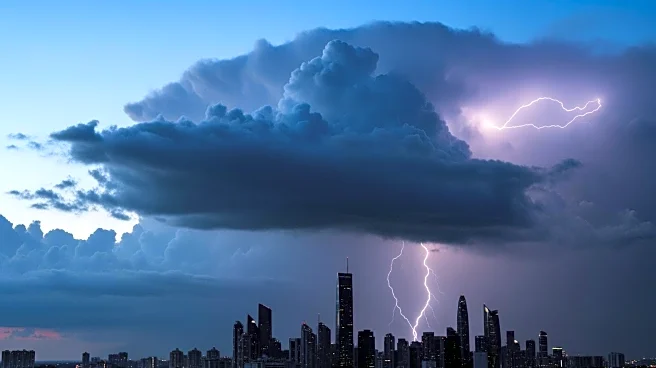What's Happening?
Turkey has emerged as a significant player in the Gaza ceasefire negotiations, following nearly two years of Israeli resistance to its involvement. The shift comes as U.S. President Trump has facilitated Turkey's entry into the talks, alongside Qatar
and Egypt. Turkish President Recep Tayyip Erdogan signed the accord at the Peace Summit in Sharm el-Sheikh, marking Turkey's participation in the international task force to locate hostages in Gaza. Despite this involvement, Erdogan's rhetoric towards Israel remains hostile, raising alarms in Jerusalem about Turkey's growing influence in postwar diplomacy. Experts suggest that Turkey's leverage over Hamas, due to its logistical and funding support, was crucial in securing the ceasefire agreement.
Why It's Important?
Turkey's involvement in the Gaza ceasefire is significant due to its potential impact on regional dynamics and Israeli security interests. While Turkey's participation is seen as a diplomatic success for Ankara, it poses strategic challenges for Israel, which has historically opposed Turkish influence in Gaza. The development could alter the balance of power in the Middle East, with Turkey gaining a foothold in Gaza and potentially influencing future peacekeeping efforts. This shift may complicate Israel's efforts to limit Turkish influence in the region, particularly in southern Syria, where Turkey's interests are expanding. The situation underscores the complex interplay of regional politics and the delicate balance of power in the Middle East.
What's Next?
The future of Turkey's involvement in Gaza remains uncertain, with potential implications for the long-term arrangement of the ceasefire. Turkey's Defense Ministry has expressed readiness to deploy forces to Gaza if necessary, indicating a possible expansion of its role. The ongoing negotiations will need to address unresolved questions about the international force composition, Hamas's disarmament, and governance structure in Gaza. As Turkey and Qatar deepen their involvement, the challenge for Israel will be to navigate these developments while maintaining its security interests. The evolving situation may require diplomatic efforts to manage tensions and prevent escalation.
Beyond the Headlines
Turkey's growing role in Gaza highlights broader geopolitical shifts in the Middle East, with implications for regional alliances and power dynamics. The involvement of Turkey, a nation with historical ties to the Muslim Brotherhood, could influence the ideological landscape in Gaza and beyond. Additionally, Turkey's assertiveness in regional affairs, coupled with Iran's weakening position, may lead to new alignments and strategic recalibrations. The situation also raises ethical and legal questions about the role of external actors in conflict resolution and peacekeeping, as well as the long-term impact on civilian populations in Gaza.
















